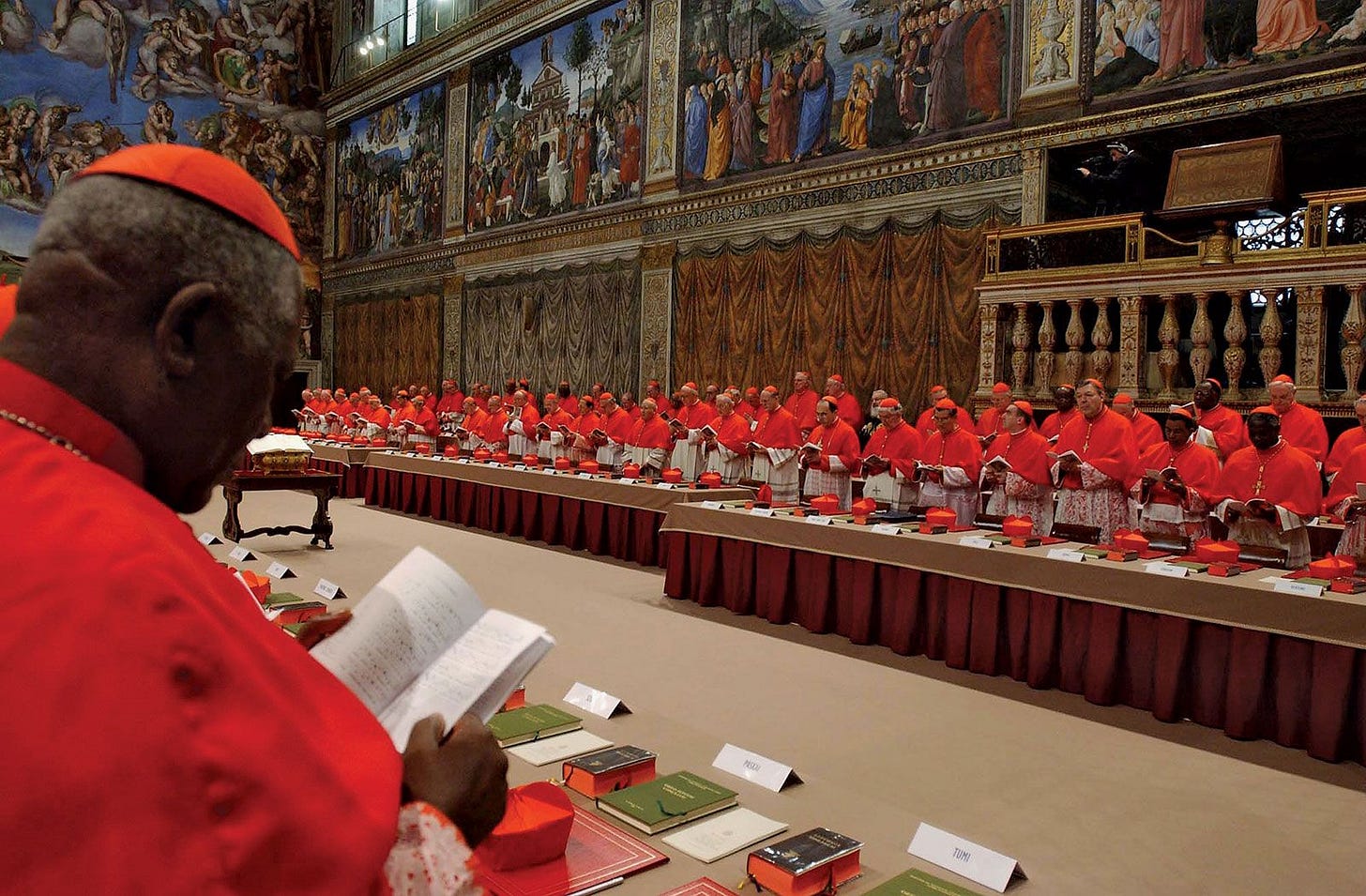July 21, 2028–The vast crowd gathered outside the National Archives Building on Pennsylvania Avenue groans once again as another column of black smoke arises from the chimney stack hastily erected on the front portico. The GOP senators, congressmen and governors who have convened in this back-to-the-past effort to choose a nominee apparently remain deadlocked.
The extraordinary decision to select a candidate through a conclave of elected officials dated back almost two years, after Republicans had gotten shellacked in midterm elections dominated by public outrage over rising prices, interest rates and unemployment as well as floods and fires that raged out of control in the absence of FEMA. While Donald Trump continued to enjoy the absolute loyalty of 40 percent of voters he and his party had utterly lost the 30 percent in the middle. Senior Republicans understood that they could not escape the stranglehold of extremists who dominated the primary system and punished even the most modest gestures of moderation. The catastrophe gave them the courage to tell Trump that they would not support his plan to run Donald Jr. as a stand-in in 2028.
What’s So Bad About Boss Rule?
It was Mitch McConnell, the gray cardinal, who proposed a system of nomination based on the model of the papacy. Who hadn’t swelled switch pride to see the first American chosen in two thousand years? Leo XIV was, it’s true, suspiciously fond of the downtrodden, but, despite having grown up in the Sixties, he appeared to vote Republican. What’s more–this, of course, sotto voce–he wasn’t a crackpot or a moron. The process weeded them out. Although in Conclave Ralph Fiennes had had had to keep both a raving Islamophobe and a Machiavellian from ascending to the throne, in the real world the College of Cardinals had a way of choosing the right man for the moment. John Paul II had stood up to the Soviets; Francis had preached humility and transparency without upsetting too many apple carts; and now we had a basketball fan who followed the Knicks.
When the party populists pointed out that the Catholic Church was based on divine authority and not popular sovereignty, McConnell parried that the GOP had done just fine for the long period–really, until 2016–when candidates were chosen by insiders. It was the Democrats that were obsessed with the vox populi, fully representative conventions, etc. All that democracy made Barack Obama possible, but also George McGovern and Jimmy Carter and Mike Dukakis and a bunch of other losers. And the real genius of the papal system was not only the wise-men-only rules but the secrecy. Your constituents will never know that you didn’t vote for JD Vance.
The old guard thought Mitch had a point. After all, in most other democracies party insiders chose the candidate. In parliamentary systems, the party leaders squared off against one another. Only the United States subjected the parties to a full-on democratic system of selection through primaries, and even that was a recent development: Hubert Humphrey had won the democratic nomination in 1968 without even entering the primaries. The system was anti-democratic. The combination of low turnout and a crowded field meant that you could win a primary with 15 percent of registered voters, as Trump had in 2016. It was rule by the lunatic fringe. And now the loonies were running the show.
The reforms were a tough sell. Much though they enjoyed stripping democratic rights from liberals, migrants, students and other bad actors, few Republican voters were prepared to surrender their own prerogatives. But after the midterms, a palace coup at the RNC replaced election-denier Michael Whatley with party regular and anodyne Midwesterner Mitch Daniels. Under the banner of “A Return To Normalcy!”, Daniels pushed through a change in party rules that made all primaries non-binding and left the final decision over the nominee to the party’s national legislators and governors. Thus the gathering in conclave.
The Normie Candidate Emerges
July 22–Unlike the cardinals, the law-makers could not be held under lock and key or kept away from the press. A steady stream of leaks issued from the great central hall of the Archives. It was said that Vance was going to win on the first ballot. In fact the Vice-President got only 39 votes; the veil of secrecy had allowed many electors to publicly pledge a vote and then place a rival’s name in the bronze urn. There were mini-booms for Pete Hegseth, Jim Jordan, Marjorie Taylor Greene; each promptly fizzled out. Some proposed reaching beyond the conclave–to Steve Schwarzman or Peter Thiel or Tom Brady. But the yearning for “normalcy” undermined the charismatic candidate as it did the extreme one.
Now, at last, the column of smoke turns white, and the crowd roars. After several minutes, Sen. McConnell, soon to retire from the Senate, appears between the great columns facing Pennsylvania Avenue. Tottering on his walker, the 86-year-old Kentuckian is determined to stage this final ritual wresting power from a president he has long despised, but to whom he has submitted. “I give you,” says Senator McConnell, “the Republican nominee for president–Governor Brian Kemp of the great state of Georgia”--a staunch conservative who twice defeated a popular Democrat in a swing state, refused to “find” votes for Donald Trump in 2020 and subsequently defeated a Trump-supported rival in a landslide. The President fires off a fusillade of outraged texts, but party insiders breathe a mighty sigh of relief.
By this time, Illinois Governor J. B. Pritzker has seized the Democratic nomination by running well to the left of fellow governors Wes Moore of Maryland and Andy Beshear of Kentucky. Pritzker had been heavily favored to defeat Vance, the presumptive nominee. But now Kemp leaps ahead in the polls and the professional odds-making. Democrats begin to wonder if they might benefit from less democracy.Habemas Candidatus!





A priceless fantasy! If only sanity would return to politics.